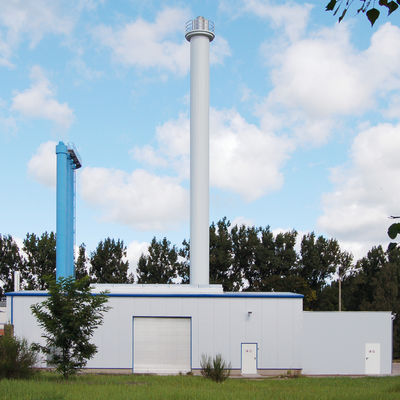Contracting
Energy system Transformation
Contracting models for energy supply according to your wishes
GETEC supplies customers with safe and cost-effective heating, cooling and electricity safely. From planning, construction and financing of the energy generation plant to operational management, maintenance and repair, we assume responsibility for your energy supply using various contracting models as a complete package or in modular form, according to your wishes. Outsourcing solutions from GETEC are never one size fits all, but always optimally tailored to your needs. Our goal is to harmonize both sustainability and economic efficiency. You focus on your core business – we take care of the rest.
By optimizing the energy supply at the client's site, energy-saving potential is determined and an efficient cost reduction is achieved. With innovative, modern technology and the optimized use of energy sources, GETEC not only reduces energy costs, we also reduce CO2 emissions, thereby increasing the value of your company. Another advantage is the fact that the investments are done off the balance sheet, ensuring your books stay lean and liquidity stays in the company.
Energy Supply
Energy contracting is a contract-based form of cooperation. There are a number of contracting models that differ primarily in terms of the focus and scope of the services offered. The client transfers selected tasks that relate to the energy management of its properties to the contracting company. The goal of this cooperation is to sustainably improve efficiency and, if necessary, to optimally integrate peripheral systems for compressed air, lighting or industrial gas supply.
By optimizing the energy supply at the contractor's site, energy-saving potential is determined and an efficient cost reduction is achieved. The cooperation form of energy contracting has already managed to establish itself for the long term on the German energy market in recent years. The reasons for this are both environmental and economic.
Energy-Saving Contracting
Identify and manage energy saving potentials
For industry and the real estate sector alike, it pays to identify and implement targeted energy-saving opportunities. Our specialists not only analyze your energy generation, but also check your specific energy consumption sources. This is where considerable savings potential can often be identified. Our savings contracting models save you money: We implement energy savings in the existing energy supply system by systematically exploiting savings potential. We guarantee the success of the savings over the entire term of the contract, making tomorrow's savings visible today.
We provide each customer with an individual catalog of measures to be implemented as agreed. As a rule, the energy-saving measures are financed from a portion of the savings generated by the energy-saving contracting. For our customers, this means an energy-efficient supply with modern technology without having to invest their own funds in renewal and savings.
Full Contracting
Full-service for the real-estate sector and industry
The full contracting model, also known as energy supply contracting, is our comprehensive worry-free package. You contract GETEC to supply the energy you need, and we look after the planning, construction, financing, operation, maintenance and servicing of the energy generation plant, which generally remains the property of GETEC, as well as the purchase of energy sources. Whether heat, cooling or electricity, you will always receive your energy in line with your needs and at favorable long-term prices. We rely on highly efficient, innovative technology and a clever fuel mix, while you focus entirely on your core business.
Energy supply contracting is suitable for both the initial installation and the renewal or takeover of energy generation plants by GETEC and is equally applicable to industrial plants, existing buildings and new buildings.
Supply Contracting
Individual solutions for your property
With operator and supply contracting, the customer generally retains ownership of the plant, but is not burdened with the essential tasks of energy supply: GETEC looks after the operation, maintenance, management and, if necessary, modernization of the energy generation plant as well as optimization of energy procurement costs.
This contracting model in which GETEC provides services for an existing plant is particularly interesting for companies that do not want to or cannot operate their plant themselves and are looking for an economical alternative.
GETEC is your expert partner for these services, with outstanding technical expertise and knowledge gained from the construction and operation of more than 7,000 power generation plants and the dynamics of the liberalized energy market.
Together we will find the energy solution that is right for you.

Enhancing energy efficiency
From an environmental perspective, energy contracting is a vital instrument for improving energy efficiency and for achieving the climate protection targets laid out by Germany and EU member states. Demand for energy is growing continuously, while the supply of natural resources such as fossil fuels is becoming increasingly scarce.
This situation, as well as the effects of climate change, pose major challenges for energy policy. Germany is planning a 55% reduction in CO2 emissions by 2030 compared to the base year, a reduction of at least 80% by 2050, and according to the Green Deal approach currently under discussion at EU level, greenhouse gas emissions will be reduced to zero.
Article 6 (3) of the European Union's Energy End-Use Efficiency and Energy Services Directive, which was incorporated into German law at the end of 2010 through the Energy Services Act, also calls for measures to increase energy efficiency and reduce CO2 emissions.
Contractor & Client
Utilities or specialized service companies regularly act as contractors. Clients are typically companies in various industrial sectors as well as municipalities and institutions in the housing sector.
Potential tasks that can be transferred from the client to the owner within the framework of energy contracting include consulting, planning, financing and construction of energy conversion plants or individual components, as well as their operation, maintenance, repair, servicing and insurance.
Both individual tasks and the entire range of tasks can be transferred.
The objects whose energy management is transferred can be, for example, industrial plants, complex properties, modern quarters or individual buildings as well as individual plants or entire industrial parks.
The financial remuneration of the contracting provider is determined by the chosen contracting model. In addition to the traditional supply contracting, there is also the possibility of structuring compensation completely or partially depending on the cost savings achieved, the so-called savings contracting.
Contracting as an instrument for enhancing energy efficiency.From an environmental perspective, energy contracting is a vital instrument for improving energy efficiency and for achieving the climate protection targets laid out by Germany and EU member states. Demand for energy is growing continuously, while the supply of natural resources such as fossil fuels is becoming increasingly scarce.
This situation, as well as the effects of climate change, pose major challenges for energy policy. Germany is planning a 55% reduction in CO2 emissions by 2030 compared to the base year, a reduction of at least 80% by 2050, and according to the Green Deal approach currently under discussion at EU level, greenhouse gas emissions will be reduced to zero.
Article 6 (3) of the European Union's Energy End-Use Efficiency and Energy Services Directive, which was incorporated into German law at the end of 2010 through the Energy Services Act, also calls for measures to increase energy efficiency and reduce CO2 emissions.
Contracting agreement: Contractor & clientUtilities or specialized service companies regularly act as contractors. Clients are typically companies in various industrial sectors as well as municipalities and institutions in the housing sector.
Potential tasks that can be transferred from the client to the owner within the framework of energy contracting include consulting, planning, financing and construction of energy conversion plants or individual components, as well as their operation, maintenance, repair, servicing and insurance.
Both individual tasks and the entire range of tasks can be transferred.
The objects whose energy management is transferred can be, for example, industrial plants, complex properties, modern quarters or individual buildings as well as individual plants or entire industrial parks.
The financial remuneration of the contracting provider is determined by the chosen contracting model. In addition to the traditional supply contracting, there is also the possibility of structuring compensation completely or partially depending on the cost savings achieved, the so-called savings contracting.
OBIETTIVI E VANTAGGI
Il vantaggio principale del contracting è l'esternalizzazione di tutte le complesse questioni e attività relative ai servizi energetici. Il fornitore del contratto, che ha una vasta esperienza, può migliorare l'efficienza energetica del progetto e ottenere quindi una riduzione dei costi di gestione.
& increasing profitabilityREDUCING COSTS
Extensive savings potentials can be identified and implemented with the help of energy contracting. The contractor closely examines both the energy flows and the energy situation of the client and helps to optimize the situation. This allows efficiency measures to be implemented as well as cost optimization measures such as load management – the targeted shifting and avoidance of peak loads. Especially energy-intensive industries can achieve competitive advantages in the ongoing process of globalization.
For the customer, contracting generally leads to cost reductions in the provision of energy, resulting in lower manufacturing costs and greater profitability. In this respect, aspects such as cost optimization, security and transparency are of critical importance. In addition, compared with in-house implementation, projects can be completed in less time and with superior quality, and the customer is not burdened with energy-related issues and can concentrate on their core business.
business performance indicators
If the contractor assumes responsibility for financing the agreed measures, the contractor also gains the freedom to use the liquidity gained elsewhere. Financial bottlenecks, a lack of willingness to take on debt and other investment priorities lose their inhibiting effect if all tasks associated with financing are transferred to a contracting provider. Furthermore, there is no negative impact on the contractor's balance sheet, resulting in a positive effect on key business performance indicators and thus on the rating and financing conditions for investments related to core competences.
business Risks
If operational management tasks and energy supply are shifted to the contractor, the client gains considerable added value through the outsourcing technical and commercial operational risks and through the assumption of functional, performance and price guarantees. This results in increased reliability and availability of the plant and minimizes the probability of breakdowns and downtimes. Ultimately, ensuring responsive and expert service and emergency response is also a core element of any contractor's quality philosophy.
CO2 Emission
In addition to the added value demonstrated for the client, contracting is also suitable for reducing CO2 emissions through the use of environmentally compatible technology. The technologies that are part of the standard portfolio of efficient contractors make a major contribution to the careful use of natural resources. With the use of environmentally compatible technology such as combined heat and power generation or the use of biomass, contracting is also an option for exploiting the considerable potential that should be used quickly for climate protection reasons.
for fuels
The value driver of contracting lies in particular in procurement advantages for fuels, because these represent the main cost item for the contractor. This is also why contracting is a such a feature in energy supply as well as the energy industry. There are few other places where an investment triggers such considerable subsequent costs, which is why the integrated approach is so dominant here. Moreover, this insight leads to a certain "law of contracting": If one considers the full lifecycle costs, high investment costs for energy supply solutions can be justified by the use of low-cost fuels.
ENERGY SYSTEM TRANSFORMATION
Apart from cost efficiency from the customer perspective, technical efficiency is of enormous importance from the contractor's perspective, as this in turn determines its earnings situation. In this respect, contracting has a natural "efficiency constraint" for the contractor. Since the economic risk of less efficient operation lies with the contractor, he must provide the energy as efficiently as possible. The fewer losses associated with useful energy generation, the better his result. Due to the inherent tendency toward maximum energy efficiency, contracting leads to decreasing emissions of pollutants and the greenhouse gases associated with energy production. The essence of contracting is to enable investments in efficient technologies, especially by reducing inefficient energy conversion, transforming energy systems and replacing older technologies. To this end, contracting as a tool delivers the necessary financial resources and know-how and offers them in the context of an all-encompassing, holistic service. The capital required for restructuring and technology substitution is freed up as contracting saves resources and replaces them with system intelligence and efficiency. As a result, contracting can help to replace antiquated technologies with sustainable ones.
WITH A FUTURE
On the basis of the aspects outlined above, it can be argued that contracting is a growth market that is far from being exhausted. For more than twenty years, the Commission of the European Union has considered contracting t the most promising method for activating energy-saving investments. It has long been calling on the member states to accelerate all contracting activities and to remove all obstacles that hinder the application of this instrument. The implementation of this EU requirement is reflected in the German government's NAPE (National Action Plan on Energy Efficiency), thus initiating wide-ranging growth momentum.
We embody partnership –
find your contact.
With more than 70 locations throughout Europe, we are always at your doorstep.
Contact us. We are here for you.



